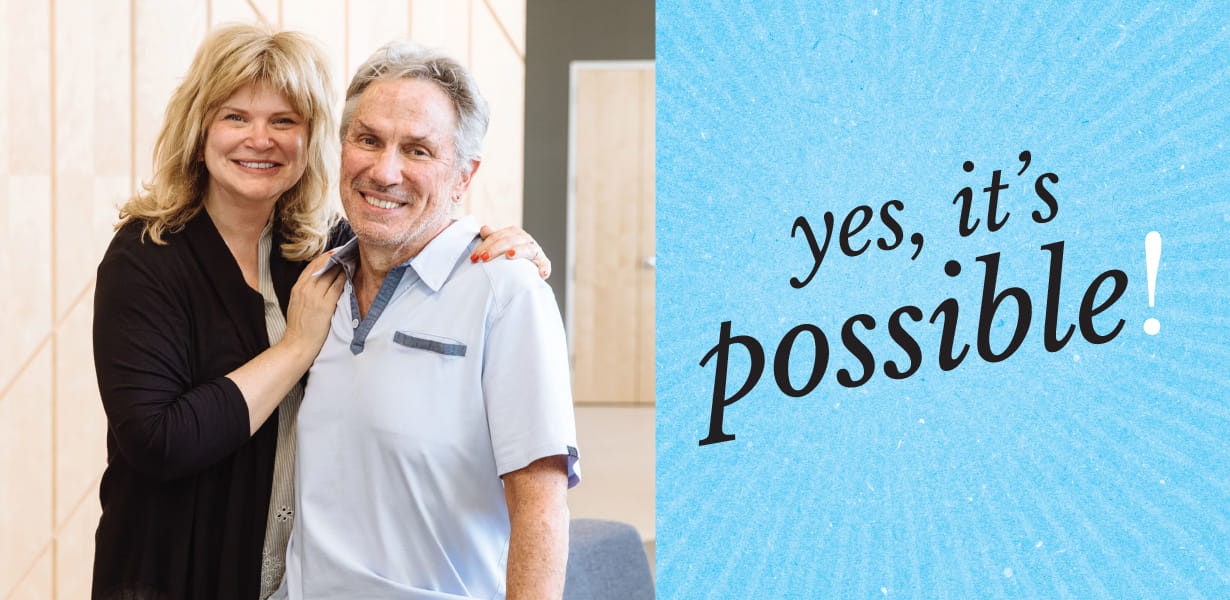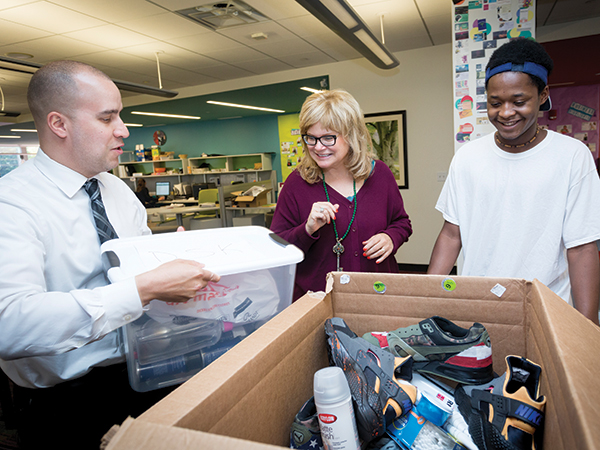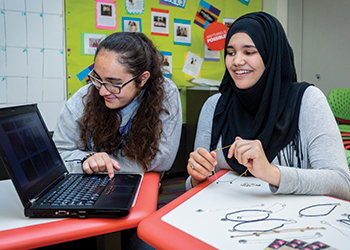Yes, it’s possible!
Mark and Becky Levin

Joandy, a recent high school graduate, runs Fixkicks, a shoe restoring and customizing business that he dreamed up and launched as part of The Possible Project, a five-year old program that is the brainchild of School of Engineering & Applied Science alumnus Mark Levin and his wife, Becky. The Levins set up the program to help underprivileged kids in Cambridge, Mass., learn entrepreneurship skills. Fixkicks is special for Levin because his father ran shoe stores in St. Louis, and he met Becky when she started working at one of them. Levin’s bio includes the phrase “If the shoe looks cool, wear it.”
Mark Levin is wearing bright orange running shoes the day we meet. He’s already blazed a trail, becoming a highly successful biotech entrepreneur and financier, notably spending 12 years as CEO of Millennium Pharmaceuticals, a biotech company that develops cancer treatments (Millennium was purchased by Takeda in 2008), then co-founding Third Rock Ventures, a successful biotech venture capital firm. In 2008, he felt it was time to strategize a different venture, a philanthropic effort to teach entrepreneurship to low-income kids.
He had had this ambition since not long after graduating from Washington University in St. Louis with a bachelor’s and master’s in chemical engineering in 1973 and 1974, respectively. Levin remains very involved with the School of Engineering & Applied Science as a member of the school’s National Council. He received an Alumni Achievement Award from the school in 2011 and the Washington University Founders Day Distinguished Alumni Award in 2002. In the late 1970s, he and Becky were living in San Francisco’s Haight-Ashbury district. Levin noticed a lot of disengaged high school kids hanging around a bakery they frequented, seemingly with nothing to do.
"I saw all these kids, and I thought, maybe entrepreneurship might help these kids learn resilience, grit and, maybe most important, 'I can do this,'" he says.
Levin thought his own life had been changed by watching his father, and then running his own business, a doughnut shop he operated with Becky that ultimately failed, but taught him great lessons.

"Becky and I talked about renting some space on Haight Street and having some businesses that kids can work in," he says.
But they were both building their careers, and there wasn't time. There wouldn't be time for several decades.
When the time came, they spent two years planning what would become The Possible Project, which offers kids a three-year program in entrepreneurship, set up after school, complete with pitch competitions. Levin thought about just donating money to an existing program, but, he says, "We really wanted to do it ourselves — we wanted to be part of it."
Both of them had been entrepreneurs — Becky Levin is founder of Levin & Co., an executive search firm — and were passionate about the skills kids could learn from turning their ideas into businesses.
They picked Cambridge, a suburb across the Charles River from Boston, because the co-founders of The Possible Project would walk by housing projects on their way to work and wanted to do something that would help kids living there. Now, The Possible Project works with the three Cambridge public high schools, bringing 10th-12th graders into their pleasant, open offices on the 3rd floor of a building not far from Harvard Square.
"The longevity of the program is key," Becky Levin says.
Research suggested that three- to six-month after-school programs didn't change much in the lives of the children who took them.
The program is free, subsidized by the Levins and other donors. In fact, high schoolers who come to the program get a stipend, starting at the equivalent of $10 a day. The stipend gives the kids a reason not to go work at a fast-food restaurant or other low-skilled jobs. Instead, kids take classes, meet with mentors, and work on their own businesses or on projects like The Possible Project's e-commerce store. Alternatively, they can spend time at the makerspace which opened in 2014 with support from Biogen, a Cambridge-based biopharmaceutical firm, and the Cambridge Housing Authority. They can also choose to work on a project it has with Lovepop, a Cambridge startup that makes three-dimensional greeting cards.
These young entrepreneurs, of whom 75 percent are from families that live below the poverty line, also get support for college applications. Those who go through the program have a high college acceptance rate compared to the national average.

Mark Levin continues to serve as a mentor. He says he sometimes catches himself being critical of his budding entrepreneurs, and then he reminds himself what he was like at their age.
"When I was 16 years old, I never talked to anybody," he says. "I don't think I would've done this after school."
A natural introvert, Mark Levin says it took him years of working in his father's shoe stores before he would come out from behind the cash register to help customers try on shoes.
Becky Levin is now The Possible Project's executive director, and dinner conversation often revolves around what's happening there. Mark Levin serves as the main strategist and is on a number of its management committees. The Possible Project is expanding into Boston, where it hopes to have 500 kids a year involved in its after-school program. He's also talked with Aaron Bobick, PhD, dean of the School of Engineering & Applied Science, about doing a version of The Possible Project outside of Boston.
Back to Engineering Momentum